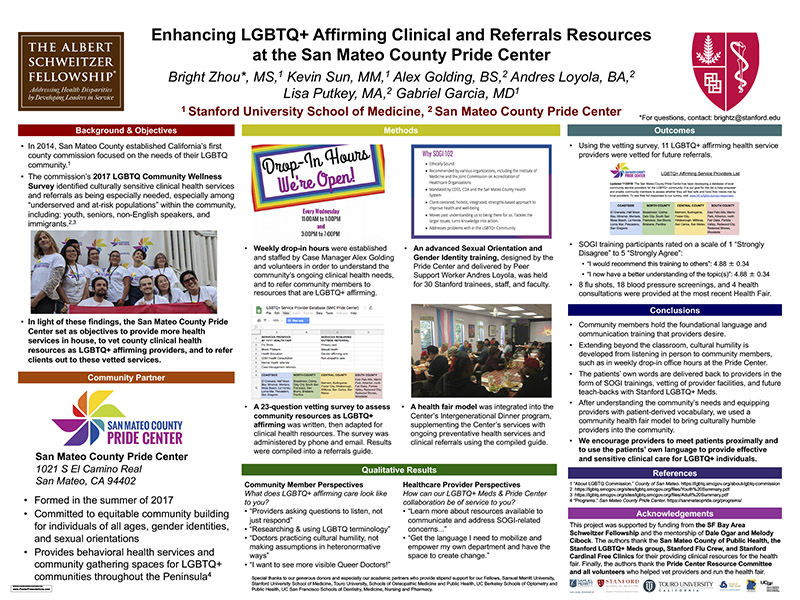
Hover to pan and click to magnify. Click again to pan at full screen.
Bright Zhou, MS, Kevin Sun, MM, Alex Golding, BS, Andres Loyola, BA, Lisa Putkey, MA, Gabriel Garcia, MD
Stanford University School of Medicine, San Mateo County Pride Center
Enhancing LGBTQ+ Affirming Clinical and Referrals Resources
at the San Mateo County Pride Center
Bright Zhou, MS, Kevin Sun, MM, Alex Golding, BS, Andres Loyola, BA, Lisa Putkey, MA, Gabriel Garcia, MD
Stanford University School of Medicine, San Mateo County Pride Center
Background & Objectives
• In 2014, San Mateo County established California’s first county commission focused on the needs of their LGBTQ community.
• The commission’s 2017 LGBTQ Community Wellness Survey identified culturally sensitive clinical health services and referrals as being especially needed, especially among “underserved and at-risk populations” within the community, including: youth, seniors, non-English speakers, and immigrants.
In light of these findings, the San Mateo County Pride Center set as objectives to provide more health services in house, to vet county clinical health resources as LGBTQ+ affirming providers, and to refer clients out to these vetted services.
Community Partner
San Mateo County Pride Center 1021 S El Camino Real
San Mateo, CA 94402
• Formed in the summer of 2017
• Committed to equitable community building for individuals of all ages, gender identities, and sexual orientations
• Provides behavioral health services and community gathering spaces for LGBTQ+ communities throughout the Peninsula
Methods
Weekly drop-in hours were established and staffed by Case Manager Alex Golding and volunteers in order to understand the community’s ongoing clinical health needs, and to refer community members to resources that are LGBTQ+ affirming.
A 23-question vetting survey to assess community resources as LGBTQ+ affirming was written, then adapted for clinical health resources. The survey was administered by phone and email. Results were compiled into a referrals guide.
An advanced Sexual Orientation and Gender Identity training, designed by the Pride Center and delivered by Peer Support Worker Andres Loyola, was held for 30 Stanford trainees, staff, and faculty.
A health fair model was integrated into the Center’s Intergenerational Dinner program, supplementing the Center’s services with ongoing preventative health services and clinical referrals using the compiled guide.
Qualitative Results
Community Member Perspectives What does LGBTQ+ affirming care look like to you?
• “Providers asking questions to listen, not just respond”
• “Researching & using LGBTQ terminology”
• “Doctors practicing cultural humility, not making assumptions in heteronormative ways”
• “I want to see more visible Queer Doctors!”
Healthcare Provider Perspectives
How can our LGBTQ+ Meds & Pride Center collaboration be of service to you?
• “Learn more about resources available to communicate and address SOGI-related concerns...”
• “Get the language I need to mobilize and empower my own department and have the space to create change.”
Outcomes
Using the vetting survey, 11 LGBTQ+ affirming health service providers were vetted for future referrals.
• SOGI training participants rated on a scale of 1 “Strongly Disagree” to 5 “Strongly Agree”:
• “I would recommend this training to others”: 4.88 ± 0.34
• “I now have a better understanding of the topic(s)”: 4.88 ± 0.34
• 8 flu shots, 18 blood pressure screenings, and 4 health consultations were provided at the most recent Health Fair.
Conclusions
• Community members hold the foundational language and communication training that providers desire.
• Extending beyond the classroom, cultural humility is developed from listening in person to community members, such as in weekly drop-in office hours at the Pride Center.
• The patients’ own words are delivered back to providers in the form of SOGI trainings, vetting of provider facilities, and future teach-backs with Stanford LGBTQ+ Meds.
• After understanding the community’s needs and equipping providers with patient-derived vocabulary, we used a community health fair model to bring culturally humble providers into the community.
• We encourage providers to meet patients proximally and to use the patients’ own language to provide effective and sensitive clinical care for LGBTQ+ individuals.
References
1 “About LGBTQ Commission.” County of San Mateo. https://lgbtq.smcgov.org/about-lgbtq-commission 2 https://lgbtq.smcgov.org/sites/lgbtq.smcgov.org/files/Youth%20Summary.pdf
3 https://lgbtq.smcgov.org/sites/lgbtq.smcgov.org/files/Adult%20Summary.pdf
4 “Programs.” San Mateo County Pride Center. https://sanmateopride.org/programs/
Acknowledgements
This project was supported by funding from the SF Bay Area Schweitzer Fellowship and the mentorship of Dale Ogar and Melody Cibock. The authors thank the San Mateo County of Public Health, the Stanford LGBTQ+ Meds group, Stanford Flu Crew, and Stanford Cardinal Free Clinics for their providing clinical resources for the health fair. Finally, the authors thank the Pride Center Resource Committee and all volunteers who helped vet providers and run the health fair.

Present with Google Meet
Invite as many as 30 people, and present your poster in high definition. Transcription option is available. Free to use.
DISQUS COMMENTS WILL BE SHOWN ONLY WHEN YOUR SITE IS ONLINE